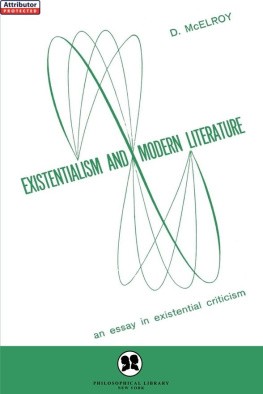EXISTENTIALISM AND SOCIAL WORK
i r rhai a garaf
Existentialism and Social Work
NEIL THOMPSON
First published 1992 by Ashgate Publishing
Published 2017 by Routledge
2 Park Square, Milton Park, Abingdon, Oxon, OX14 4RN
711 Third Avenue, New York, NY 10017, USA
Routledge is an imprint of the Taylor & Francis Group, an informa business
Copyright Neil Thompson 1992
All rights reserved. No part of this book may be reprinted or reproduced or utilised in any form or by any electronic, mechanical, or other means, now known or hereafter invented, including photocopying and recording, or in any information storage or retrieval system, without permission in writing from the publishers.
Notice:
Product or corporate names may be trademarks or registered trademarks, and are used only for identification and explanation without intent to infringe.
A CIP catalogue record for this book is available from the British Library and the US Library of Congress.
ISBN 13: 978-1-85628-377-9 (hbk)
Contents
Existentialist philosophy has long been recognised as a significant influence on psychotherapy and counselling and there is an established school of existential therapy. However, in social work there is no equivalent and the existentialist influence is far less discernible. Existentialism is conspicuous by its absence from the social work curriculum, especially in Britain.
This book is an attempt to go some way toward rectifying that situation by presenting existentialism as a viable theory base for modern social work practice - a philosophy which can help us make sense of many of the complexities, contradictions and dilemmas of social welfare.
Existentialism is a philosophy which places human freedom at the forefront of its attempts to understand the various dimensions of existence. But this is no easy freedom, no caprice or idealism. It is a freedom grounded in the myriad constraints, influences and sober lessons of complex social and political interactions. It is a freedom which entails responsibility, ownership of ones actions and their consequences. Such freedom is both a heavy burden and the key to overcoming a range of problems of our own making - self-made barriers to deny freedom and responsibility at both an individual and collective level.
The existentialist portrayal of humanity is of people seeking to make sense of an absurd existence, located within a broader context of structured inequalities and the oppression and alienation they engender. It is argued that the problems social workers face have a significant existential dimension and it is the crux of this book that an approach informed by the tenets of existentialism is necessary to do justice to this complex subject.
Existentialism is a philosophy of praxis of thinking and doing. As such it offers a basis for social work theory and practice by constructing an overarching framework which seeks to account for the many facets of social work - theoretical, practical, moral, political and of course existential.
This book is therefore an exploration of the issues surrounding the application of existentialism (specifically, Sartrean existentialism) to social work and, flowing from this, the formulation of a set of principles for practice. The basic principles and key concepts of existentialism are explained and their significance for social work is commented upon. This acts as the basis of a critique of dominant approaches to theory and practice, evaluated from an existentialist perspective, and an examination of how existentialist ideas can be used to guide practice.
These discussions are also considered in terms of the broader sociopolitical context of social work. This reflects the existentialist approach - to focus on issues of meaning, value and purpose for individuals and families but to locate these in the wider context of social and political factors such as class, race and gender. It is not enough to focus on the individual dimension, nor indeed on the sociopolitical dimension; what is needed is an approach which addresses both dimensions simultaneously by appreciating their interaction - and also by setting both in the context of the dimension which unifies them, namely the existential.
Social work deals with much of the pain, suffering and distress of humanity and reflects many of the profound contradictions and paradoxes of human existence. It is therefore surprising that the insights of existentialist philosophy have not been brought more fully to bear in the history of social work to date.
Many people have helped in the production of this book. In particular, I am very grateful to Colin Richardson, fellow of Keele University, for his advice, assistance and encouragement throughout the project -but most of all I have appreciated his enthusiasm.
I received helpful advice and comments from a number of people who were kind enough to read the first draft of the manuscript: Professor Eric Sainsbury of Sheffield University, Clive Curtis of Cheshire Social Services, Ian Crompton of West Cheshire College, Jethro Newton of North East Wales Institute of Higher Education, and Roger Sibeon and Terri Whitaker of Liverpool University.
The dedication and hard work of Joyce Thompson in typing the manuscript are very much appreciated. I have also benefitted greatly from the ongoing support of Susan Thompson from the inception of this project right through to the completion of the final text.
It is important to acknowledge the benefit I have gained from discussions with a wide range of social work practitioners and educators who are too numerous to mention by name. I am grateful to all who have contributed to the development of this book but I remain, of course, responsible for any inadequacies or inaccuracies it contains.
For many years now social work has been going through a period of change and turmoil brought about in no small part by the breakdown of consensus over the role of welfare in society which has emerged as a result of the rise of New Right ideology and a stronger focus on market economy and individualism (see, for example, Loney et al., 1991, Part III).
For many, it has felt as though the very basis of social work has been threatened by a political climate hostile to the development of state welfare services to cater for vulnerable and disadvantaged groups in society. In this context, it would therefore not be surprising if there were to be strong resistance to yet more talk of change. Despite this background, this text proposes a new way of looking at social work theory and practice.
I feel it is worth putting these ideas forward because they give a framework which can help to deal with change. In fact it is a basic premise of the existentialist approach that change, doubt and uncertainty are fundamental aspects not only of social work in particular, but of human existence in general.
Clearly it would be pointless and counter-productive to turn our backs on these issues and hope they will simply go away if we ignore them. We need a philosophy which can equip us to come to terms with such basic problems. In many respects existentialism can meet this need. This study is an exploration of the possibilities of applying existentialist philosophy to social work.
No doubt the term philosophy will cause a few eyebrows to be raised as this is often identified with high-brow ideas largely irrelevant to the real world and expressed in elitist jargon. Existentialism is not entirely free of such criticism, but its roots are very firmly based in day to day reality. Moreover, as a philosophy which lays great emphasis on subjective experience it is more readily compatible with actual practice than objective social science can be. These are important points which will be dealt with in greater detail in .














